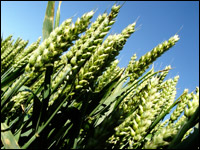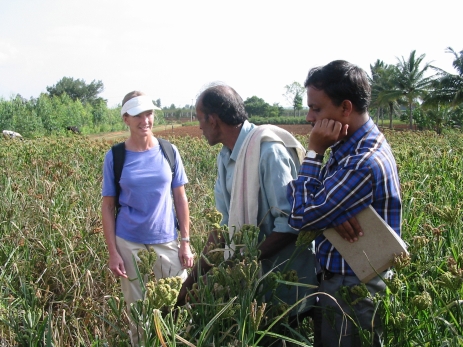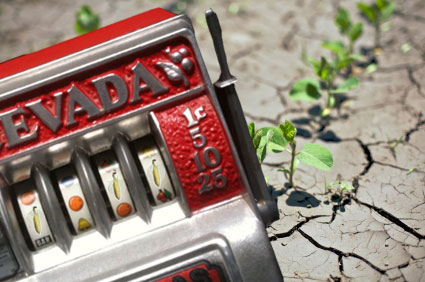hunger
-
How climate change is starving the world
It was supposed to take until 2080 for food prices to double. Sure, climate change can make arable land into irrigation-hungry desert, and increase the likelihood of crop-destroying severe weather (and wildfires). But ironically, increased carbon dioxide also helps plants grow, so this was all supposed to be under control for the foreseeable future. Turns […]
-
Rising commodity prices and extreme weather events threaten global stability
Get ready for a rocky year. From now on, rising prices, powerful storms, severe droughts and floods, and other unexpected events are likely to play havoc with the fabric of global society, producing chaos and political unrest.
-
Feeding the world means hogging less grain
How many people can the Earth support? Depends on their level of food consumption. At the U.S. average of 1,763 pounds of grain per person annually for food and feed, the 2-billion-ton annual world harvest would feed just 2.5 billion people.
-
Our biofuel future: The bitter taste of land grabs and hunger
Stanford professor Roz Naylor lays out how a global ramp-up of ethanol and biodiesel production means land speculation and rising food prices for the world's poor. Can the world stomach such a fuel-ish transition?
-
Purdue’s Gebisa Ejeta on the vexing task of feeding a growing population
Over the next several weeks, I'll be attending the University of Washington's food and environment lecture series and harvesting knowledge from a diverse array of food-system luminaries. Plant breeding expert Gebisa Ejeta of Purdue University opened the series -- and a pot of worms -- by talking up a new petrochemical-dependent "Green Revolution" in Africa and talking down the potential of organic farming in feeding the masses.
-
The Population-Poverty Connection
The 21st century began on an inspiring note: The United Nations set a goal of reducing the share of the world’s population living in extreme poverty by half by 2015. By early 2007, the world looked to be on track to meet this goal, but as the economic crisis unfolds and the outlook darkens, the […]
-
Are GMOs the ‘financial innovations’ of agriculture?
(Photoillustration by Grist)Financial blogger Felix Salmon has an essay in Foreign Policy called “How Locavores Can Save the World” — expanded, by the way, from a wonderful blog post he wrote after attending a panel discussion on world hunger at the Davos World Economic Forum in the company of Blue Hill Farm’s Dan Barber. Salmon […]
-
Maybe locavores can save the world after all
Financial blogger Felix Salmon has an essay in Foreign Policy called “How Locavores Can Stop World Hunger.” Salmon normally focuses on issues involving economic crises, monetary policy, complex derivatives, macro-economics and governmental oversight of financial markets — but here is talking monocultures, sustainable agriculture and GMOs. Tom Philpott has opined on the similarities between financial […]
-
Ask Umbra’s Change Agent: Hannah Salwen
What would you do with half? Half the house, half the lattes, half the TV watching, half the Tweets, half the email checking? More importantly, what would you do with the other half — the extra space, funds, and time? Dearests, meet 17-year-old Atlanta Girls’ School junior Hannah Salwen (you may have read about her […]





